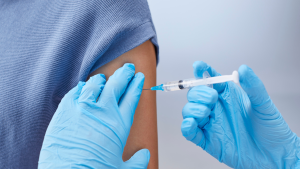
FDA Approves New Version of PrEP—Just Two Shots A Year
The FDA has approved lenacapavir as a form of pre-exposure prophylaxis (PrEP), offering a new option for HIV prevention requiring only two shots per year.

Mpox cases in the United States are almost double what they were at this time last year, according to new data from the Centers for Disease Control and Prevention (CDC). While rates still remain far lower than they were during the outbreak of 2022, experts worry that too few people are vaccinated.
As of mid-March, there were an estimated 511 cases of the virus compared to just 287 at the same time last year. New York City has had over 100 cases so far this year compared to just 30 last year, and the Virginia Department of Health recently issued a warning about a rise in cases in the state.
Dr. Brandy Darby, director of the department’s Division of Surveillance and Investigation told CNN: “We felt like it was really important to get the word out that there is a continued risk from this virus. It’s still here.”
Mpox, which used to be known as monkeypox, is a virus that causes flu-like symptoms and a rash/sores on the skin. It is transmitted through skin-to-skin contact or contact with an infected person’s clothing, towels, or bedding. While not technically an STI, mpox is passed through close physical contact.
The majority of the cases in the 2022 outbreak were the result of sexual behavior. Anyone can get mpox, but gay and bisexual men, other men who have sex with men, and transgender individuals were disproportionately affected by that outbreak.
A survey from August of that year found that about half of men who have sex with men changed their behaviors during the mpox outbreak. Many chose to have fewer sex partners, use dating apps less frequently, and/or have fewer one-time sexual encounters. Research has found that these changes did a lot to curb the spread of mpox. While this was important during the outbreak, it is not sustainable or necessary long term.
Instead, the CDC recommends the JYNNEOS vaccine for people who are likely to be exposed to mpox, including gay, bisexual, and other men who have sex with men or are transgender, gender non-binary, or gender-diverse. Specifically, the agency suggests the vaccine for members of this community who, in the last six months, have had more than one partner, been diagnosed with an STI, visited commercial sex venues (like sex clubs or parties), or had sex at a large public event (like a festival) in areas where mpox transmission is occurring. Partners of people who fit these criteria should also get vaccinated. The vaccine is also recommended for anyone who has HIV or other immune system issues.
The vaccine is given in two doses. Vaccination rates are still not what they should be, however. In most states less than a quarter of the population at risk has been fully vaccinated, and coverage is below 10% in eight states.
As rates of mpox go up, the CDC is recommending that anyone who fits the criteria and has not been fully vaccinated do so now. Ideally, doses are given four weeks apart, but experts are suggesting that anyone who has had one dose get the second one as soon as possible regardless of when the first was given. There is no supply issue so vaccines should be readily available. The mpox vaccine locator below can help people find vaccines in their area.

The FDA has approved lenacapavir as a form of pre-exposure prophylaxis (PrEP), offering a new option for HIV prevention requiring only two shots per year.

On a recent episode of Love Island, a cast member sugested that we could blame our current STI epidemic on men who had sex with animals. She pointed to koalas with chlamydia as an example. There’s some truth here, but also a lot of misinformation.

A new report from the Centers for Disease Control (CDC) shows that we’re missing opportunities to prevent congenital syphilis and save lives.

There’s potential good news in gonorrhea prevention as a series of studies suggests that certain meningococcal B (MenB) vaccines can reduce the risk of gonorrhea.

There is new guidance on pain management for IUD insertion and acknowledgement that providers often underestimate the pain patients feel during their procedures.

The FDA just approved the Teal Wand, a self-collection device for HPV testing that does not require a speculum exam or even a trip to the doctor’s office. People can collect their own sample at home and send it to a lab for analysis.
ASHA believes that all people have the right to the information and services that will help them to have optimum sexual health. We envision a time when stigma is no longer associated with sexual health and our nation is united in its belief that sexuality is a normal, healthy, and positive aspect of human life.
ABOUT
GET INVOLVED
ASHA WEBSITES
GET HELP
© 2025 American Sexual Health Association